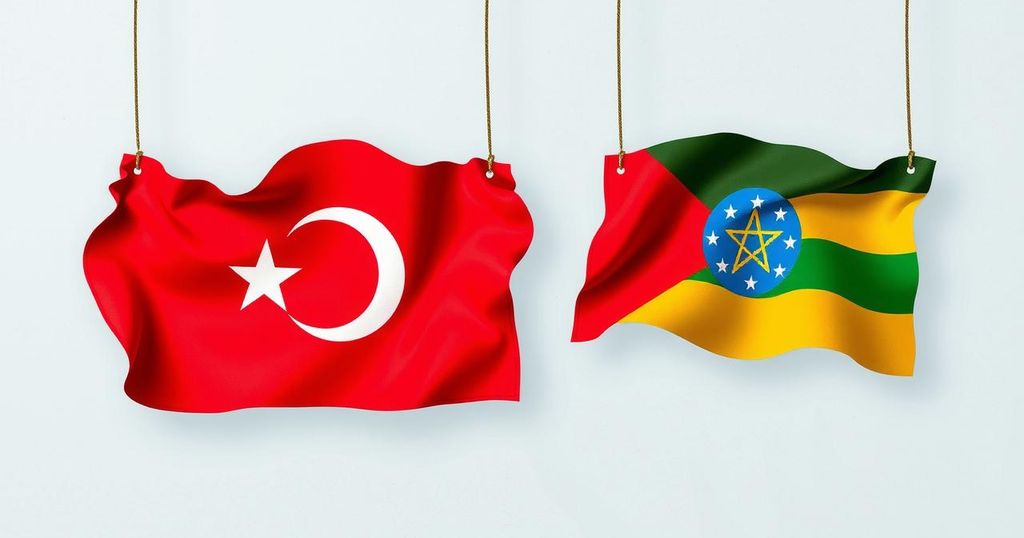In Ankara, Somalia and Ethiopia reached a landmark agreement mediated by Turkey, addressing maritime access and ensuring mutual recognition of territorial integrity. The Ankara Declaration enhances Somalia’s international standing and provides Ethiopia with essential coastal access for trade, establishing a cooperative framework amid longstanding tensions in the region.
In Ankara, the leaders of Somalia and Ethiopia convened, striving to resolve a long-standing maritime conflict with the mediation of Turkey. Amid pressures, Somali President Hassan Sheikh Mohamud insisted on Ethiopia’s cancellation of a controversial agreement with Somaliland, believed to threaten Somalia’s sovereignty. Turkish President Recep Tayyip Erdogan emphasized the urgency of reaching resolution, leading to extensive negotiations where Ethiopia ultimately recognized Somalia’s territorial integrity, thus facilitating Ethiopia’s access to Somali coastal ports. This agreement, viewed as mutually beneficial, reinforced Somalia’s international standing while addressing Ethiopia’s essential maritime needs.
The negotiations, attended by President Erdogan and Ethiopian Prime Minister Abiy Ahmed, extended for nearly seven hours, highlighting the complexities underlying territorial disputes in the region. The crux of the discussions centered on Ethiopia’s acknowledgment of Somalia’s territorial unity, a condition Somalia asserted was imperative for recognizing its borders. Despite initial resistance, a compromise culminated in the Ankara Declaration where the leaders reached consensus on critical security and economic issues. This agreement is poised to foster continued collaboration, including discussions on further technical negotiations set for February 2025.
The backdrop of this diplomatic engagement stretches beyond mere territorial disputes. Turkey has significantly invested in Somalia since 2011, reflecting its strategic interests in establishing a foothold in the region. The historical tensions and emergent political dynamics, especially regarding Somaliland’s fluctuating status, have influenced the broader negotiations. Thus, this agreement serves not only as a diplomatic breakthrough but as a strategic alignment that addresses Ethiopian access to critical maritime trade routes, essential for its development.
“Somalia, earlier this year, signed a comprehensive naval and energy deal with Turkey to guard its waters and establish a naval force with Ankara’s help,” said Ebuzer Demirci, highlighting the strategic gains for Somalia. In essence, Prime Minister Abiy Ahmed’s acknowledgment of Somalia’s territory marks a significant shift in Ethiopian policy, successfully estranging itself from potential conflicts with Somaliland advocates.
The negotiations between Somalia and Ethiopia were framed within a historical context of territorial disputes, particularly stemming from a 2022 memorandum of understanding between Ethiopia and Somaliland. Somaliland’s aspiration for international recognition posed significant threats to Somalia’s established territorial integrity, compelling the Somali leadership to protect its claims. Turkey’s role as a mediator reflects its geopolitical ambitions in the Horn of Africa and its longstanding support for Somalia since 2011. This development is critical as it intertwines security, trade, and international relations in a complex regional landscape.
This agreement marks a pivotal moment in Somali-Ethiopian relations, fostering stability while enhancing Turkey’s influence in the region. The Ankara Declaration addresses key demands from both sides, encapsulating mutual recognition and cooperation in a manner that promises to alleviate longstanding tensions. With additional negotiations on the horizon, this agreement not only sets forth immediate rewards but also lays the groundwork for future diplomatic relations, integral for regional development.
Original Source: www.middleeasteye.net







